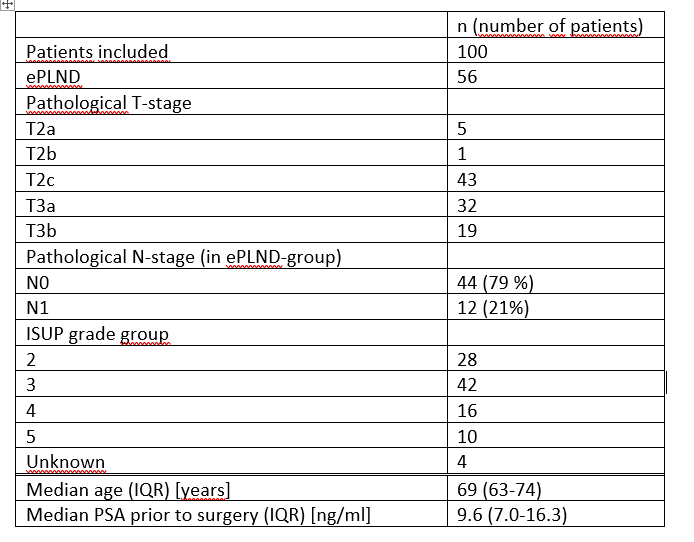Influence of PSMA-PET on treatment of prostate cancer patients with biochemical recurrence
Ingerid Skjei Knudtsen,
Norway
PO-1468
Abstract
Influence of PSMA-PET on treatment of prostate cancer patients with biochemical recurrence
Authors: Ingerid Skjei Knudtsen1, Bendik Skarre Abrahamsen2, Kirsten Margrethe Selnæs3, Mattijs Elschot1,3, Sverre Langørgen3, Thomas Morten Keil3, Håkon Johansen3, Helena Bertilsson4,5, Torgrim Tandstad6,5, Tone Frost Bathen1,3
1Department of Circulation and Medical Imaging, Faculty of Medicine and Health Sciences, Norwegian University of Science and Technology, Trondheim, Norway; 2Department of Circulation and Medical Imaging , Faculty of Medicine and Health Sciences, Norwegian University of Science and Technology, Trondheim, Norway; 3Department of Radiology and Nuclear Medicine, St. Olavs hospital, Trondheim University Hospital, Trondheim, Norway; 4Department of Urology, St. Olavs hospital, Trondheim University Hospital, Trondheim, Norway; 5Department of Clinical and Molecular Medicine, Faculty of Medicine and Health Sciences, Norwegian University of Science and Technology, Trondheim, Norway; 6The Cancer clinic, St. Olavs hospital, Trondheim University Hospital, Trondheim, Norway
Show Affiliations
Hide Affiliations
Purpose or Objective
PSMA-PET is becoming part of clinical practice for detection of recurrent prostate cancer, but is a resource-demanding examination limited by decreasing detections rates at lower PSA levels.We have investigated how a combined PSMA-PET/MRI/CT-protocol affected treatment of patients referred to our hospital as candidates for salvage radiotherapy (RT) after biochemical recurrence (BCR).
Material and Methods
Patients included in the present analysis had undergone radical prostatectomy (with/without extended pelvic lymph node dissection), and presented with BCR in accordance with the European Association of Urology.
The imaging protocol consisted of MRI (chin to thighs), 18F/68Ga-PSMA PET/CT (vertex to thighs) and PET/mpMRI of the pelvic region, performed sequentially. The PET/CT, PET/mpMRI and mpMRI were evaluated separately by specialists in nuclear medicine and radiology and then in consensus. Imaging recurrence was defined as local/loco-regional/metastatic disease according to consensus. This was compared to corresponding readings of mpMRI only.
Change of treatment due to PSMA-PET was defined by change from intended treatment for cases where a) imaging recurrence according to consensus differed from mpMRI and b) this difference resulted in upgrading of disease necessitating other treatment than observation or standard salvage RT of the prostatebed +/-/ elective RT of the pelvic region.
Differences between groups were assessed by the Wilcoxon rank-sum test (p<0.05 considered statistically significant).
Results
From May 2020 to March 2022, 100 patients were included and eligible for analysis (see table for clinical data). The median PSA level at time of imaging was 0.38 ng/ml (interquartile range (IQR) 0.21-0.61). Recurrent disease was detected in 42% of patients based on PET/CT/mpMRI, 42% presented with recurrent disease, 8 % were uncertain and 50% had no detected recurrence. Recurrent disease was detected in 17% based on MRI/mpMRI only, 9% were uncertain and 74% had no recurrence.
For 20 patients (20%), PET/CT/mpMRI uncovered more advanced disease leading to change of treatment. 6 had metastatic disease incompatible with curative treatment and initiated hormone therapy only. 10 patients had recurrence in loco-regional lymph nodes and were referred to standard treatment consisting of hormone therapy and RT of the pelvic region, but including dose escalation to affected lymph nodes. 4 patients had single metastatic skeletal lesions compatible with stereotactic RT or dose escalation within the elective RT volume. Median PSA level of patients with detected recurrence (PET/CT/mpMRI) was 0.41 ng/ml (IQR 0.31-1.0), significantly higher than the group with no detected recurrence (0.30 ng/ml, IQR 0.23-0.47).
Conclusion
In this low-level PSA patient group, PSMA-PET/CT/MRI identified recurrent disease in 42 %, more than twice as many patients as mpMRI. 20 % of the patients presented with advanced disease demanding change of treatment based on PSMA-PET.
